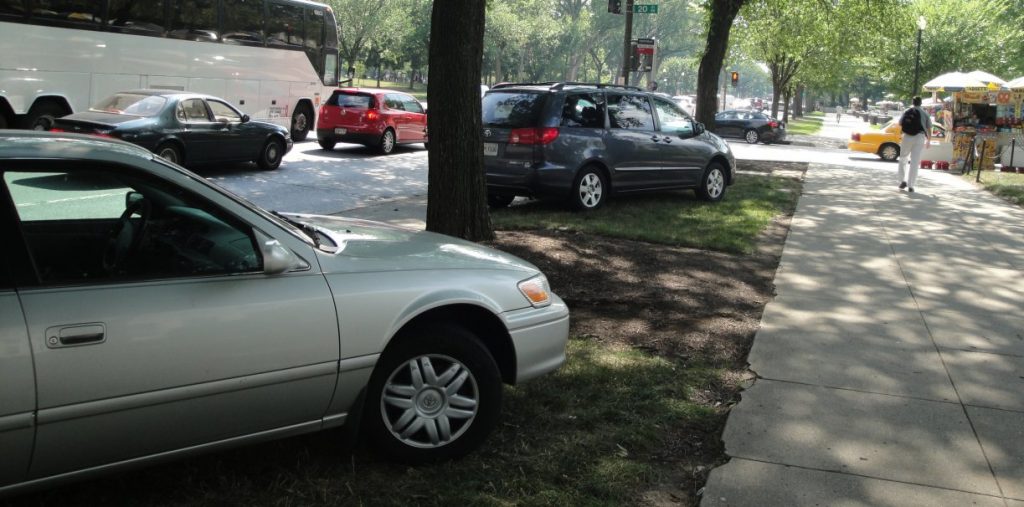I studied two things in college that I have not used since and rarely seen others use. Those were classical Greek and calculus. I am not saying that either was useless, but both were more ornamental than practical. The difference is that everybody knows that Greek is a kind of intellectual exercise, maybe even an indulgence, while many people – most who have never studied calculus – think it that a population generally conversant in calculus is a golden key to international competiveness. Come to think about it, Greek has been more useful to me.
I didn’t come up with this myself. Gregg Easterbrook in his book Sonic Boom questioned the efficacy of higher math for the masses. He said that pushing higher math for everybody just has the effect of making lots of teenagers feel stupid. Probably a majority of students cannot master calculus and the time & energy spent trying to hammer the big square peg of complicated math into the smaller round holes of limited cognitive ability could be better spent elsewhere. As I said, I took calculus, but the only time I ever used it was to get into business school. I really think the primary purpose was to create a filter for the school. Requiring calculus keeps down the numbers of applicants and is a proxy for significant years of study.
Let me be clear. I am not saying that higher math skills are not important for society; I am just saying that they are not important for most people, not attainable for most people and not sustainable even for those who learn them but don’t use them in daily life. I have not used calculus since I left college and now my skills have atrophied to the extent that the difference between me and someone who has never taken the subject at all approaches zero. The same goes for my Greek, BTW, but in the case of the Greek I still retain important knowledge from the underlying documents.
I agree with Easterbrook when he says that it would be much more useful to give the masses of students a better grounding in things like economics and statistics. Those are things that I do use almost every day and it is clear from the decisions people make that many do not understand the basics enough to apply them to their own lives.
Another dumb thing that sounds smart is the idea of self sufficiency. I read Thoreau when I was a kid and I even bought books that explained how a person could support himself on as little as a couple acres of land. Of course you would have to live like a medieval peasant, i.e. like shit, but you could do it. (I am reading another good book called the Rational Optimist that cut through some of the pabulum that life was better in the past or is better still in less developed places.) Self sufficiency sounds attractive but why would you do it when working and interacting with others is so pleasant and profitable? Specialization is the key to prosperity and happiness. It is the capacity to do some things well and trade them that makes us better off, not some kind of ability to do lots of things clumsily
I don’t have to know calculus because I know that some smart guys do and I can rely on them. This is just the basic economics that so many people don’t learn about in school. A good essay explains how we are all interacted. It is called I Pencil. Kids would read it in HS, if they were properly educated in economics.
Related to the myth of self sufficiency is the idea that a person should be “well rounded” and be able to do many things. We hear that at work or in school. People try to make up for their deficiencies, which is great … as long as it doesn’t come at the expense of developing strengths. The fact is that we usually become successful at developing strengths, not making sure we can do everything. As I mentioned above, I don’t need to learn calculus and time spent developing it, where I have no natural inclinations or talents, would be wasted.
With something like “well rounded” there is threshold. If you are below the threshold, you cannot properly function, but at some point you are good enough at the things you are not very good at doing. It is binary. After you cross the threshold, getting better is not necessary. After crossing the threshold, it is better just to avoid the things you don’t do well. Let somebody else do it, somebody who likes it better and is better at doing it.
This shows up in my panels. Some people are good at lots of things. They are well rounded. They tend not to get promoted. It is better to be acceptable at most things and really exceptionally good at a few. Playing to strengths while minimizing or avoiding weaknesses is better than trying to fix every problem.
George C Marshall, the architect of victory in World War II, used to say that it was more important to ask what a man could do and let him do that than to ask what he couldn’t do. People with great talent are often uneven personalities. George Patton was not much of a diplomat, but he was very good at pushing armored units through German lines. Marshall used Patton where he could do some good. Eisenhower was not the greatest strategist in the war, nor did he have real combat experience, but he could cobble together coalitions. That is what he did.
Finally re the dumb things that sound good is learning foreign languages. We Americans castigate ourselves and accept the criticism of others because we don’t learn foreign languages. Well … what foreign language should we all learn? It is an easy choice for non-English speakers. English is the world language. Learn English. No other language is so widespread or universally useful. We already know English. So do we learn Spanish, which is no use anywhere besides Latin America and parts of the Iberian Peninsula? Chinese has the greatest number of speakers, but it is not the language of business of commerce even in Asia. What about all those poor kids whose parents immersed them in Japanese, back when Japan was supposed to take over the world in the early 1990s? How useful has that been for them, I wonder?
If you don’t know where you are going, you should just keep and improve English or maybe simplify it into Globish.
I have to caveat – again – if you are going to live in a country, learn the language. I learned several and hold myself to a high standard (i.e. I actually want to speak it well enough the people know what I want and don’t feel the overwhelming urge to compliment me on how well I speak their language. You know you doing poorly when they compliment you in the first couple minutes, especially if they do it in English). That is why I question the idea of general language learning. I am now working to get my Portuguese back. I once spoke it well and will again, but in between not so much. One of my tasks is to purge out Polish and Norwegian, which are now flowing back into my brain as “foreign”. When my Portuguese is again very good, I won’t be able to command the Polish, Norwegian or German that I once could.
Language must be used to be kept and few of us have enough time in the day,opportunities to practice or actual talent to remain “mulitlingual,” even if we ever mange to achieve it. Most of us also have more important things to do than practice a language we rarely use. Learning languages in college won’t cut it, unless your standards are very low. Which brings me in complete circle back to the Greek or more broadly the classics. I studied both Greek and Latin in college and, as I admitted, I really cannot remember the languages well enough to read them anymore. But I do remember the content of much of what I read. Classical languages give you access to a full panoply of Western thought and literature.
IMO, if you want to just learn “a language” in college, with no more specificity than that, you are probably better off studying Latin than any “living” language. You will get access to many more centuries of literature of history and when you forget the language, as you inevitably will, you may remember some of that literature and history. When/if you figure out where you want to go in the non-English speaking world, learn the language then. Latin will probably help with that.






